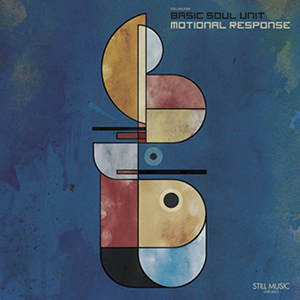Basic Soul Unit Motional Response
Toronto’s Stuart Li, having spent the past decade operating under the moniker Basic Soul Unit, […]

Toronto’s Stuart Li, having spent the past decade operating under the moniker Basic Soul Unit, has produced a slew of singles and EPs over the years for labels like Ostgut Ton, Mule Electronic, Crème Organization, and Versatile. At this point, Li is something of a veteran of these smaller formats, yet Motional Response marks his full-length debut. Attacking this extended format with adroitness, Li offers a cross-section of his potent deep-house-cum-techno sound, resulting in a release that’s both hypnotic and visceral.
Motional Response is markedly accessible, never straying exceptionally far from familiar deep house or techno soundscapes. If anything, this digestibility could be the biggest mark against the album; while the whole thing goes down smooth, it’s difficult to pick moments or tunes that stand out from the rest.
Perhaps the main exception to this amalgamated quality is “Breathe,” the only track to feature vocals. It’s a slow burner that sits trepidatiously on a tense chord structure; the female vocals nearly land it in soulful deep-house territory, but the close harmonies and uneasy timbre prevent it from being marginalized as something so squarely traditional.
This slight tweak on traditional modes is pervasive in Li’s sound; “Sandpiper” begins with a 303 line that sounds sure to build into a stomping four-to-the-floor, but instead, a ghosted syncopation of kicks and delayed, off-grid hi-hats keeps the production even before it builds with an icy lead. “Across the Room” and “All Over Me” follow suit, taking subtle aural left turns while gradually rolling out disparate layers of percussion and clever synthwork without being jarring or cerebral.
Across Motional Response, Li showcases this exceptional ability to choose a palette that remains unobtrusive, but heady. “Intersection” progresses slowly from spare, buzzy bass kicks, adding a hyper-filtered rumble with glitchy artifacts over the top. A quavering pad fades into the mix, accented by a 303 jumping octaves with the ebb and flow of the arrangement. All of this happens without the listener really being aware—it’s more emotive than emotional.
The grit of Chicago and Detroit has a clear influence on Li—bit-crushing, distortion, acid, and acoustic drum samples on tracks like “Back Seat Lover” and “This” speak to an aesthetic informed by both an organic sensibility and warehouse grunge. At the same time, an aura of late-’90s San Francisco deep house floats over the record, even if it’s only present in ephemera. On “Mind Forest,” a clock-like, resonant ticking offsets a straight-ahead house groove; James Stinson meets Charles Webster with a pointed subtlety.
While Motional Response does tend to coalesce, it’s difficult to view that tendency wholly negatively. There’s an almost gestalt quality at play; it’s not the kind of album that’s going to be coveted because of a couple of big tunes. Instead, it’s an LP that will get played front to back, and with great regularity for those with a penchant for these sounds. Motional Response appeals to the listener on a somatic level with understatement, making it perennially fresh and engaging.

